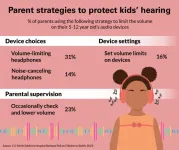(Press-News.org) As we get older, we may start to notice it takes us longer to find the right words. This can lead to concerns about cognitive decline and dementia.
However, a new study by Baycrest and the University of Toronto suggests that talking speed is a more important indicator of brain health than difficulty finding words, which appears to be a normal part of aging. This is one of the first studies to look at both differences in natural speech and brain health among healthy adults.
“Our results indicate that changes in general talking speed may reflect changes in the brain,” says Dr. Jed Meltzer, Baycrest’s Canada Research Chair in Interventional Cognitive Neuroscience and the lead author on this study. “This suggests that talking speed should be tested as part of standard cognitive assessments to help clinicians detect cognitive decline faster and help older adults support their brain health as they age.”
In this study, 125 healthy volunteers aged 18 to 90 completed three different assessments. The first was a picture-naming game, in which they had to answer questions about pictures while ignoring distracting words they heard through headphones. For example, when looking at a picture of a mop, they might be asked, “Does it end in ‘p’?” while hearing the word “broom” as a distraction. In this way, the researchers were able to test the participants’ ability to recognize what the picture was and to recall its name.
Next, participants were recorded as they described two complex pictures for 60 seconds each. Their language performance was then analyzed using Artificial Intelligence-based software, in partnership with Winterlight Labs. Among other things, researchers examined how fast each participant spoke and how much they paused.
Finally, the research participants completed standard tests to assess mental abilities that tend to decline with age and are linked to dementia risk – namely, executive function, which is the ability to manage conflicting information, stay focused and avoid distractions.
As expected, many abilities declined with age, including word finding speed. Surprisingly, although the ability to recognize a picture and recall its name both worsened with age, this was not associated with a decline in other mental abilities. The number and length of pauses participants took to find words was not linked to brain health. Instead, how fast participants were able to name pictures predicted how fast they spoke in general, and both were linked to executive function. In other words, it wasn’t pausing to find words that showed the strongest link to brain health, but the speed of speech surrounding pauses.
Although many older adults are concerned about their need to pause to search for words, these results suggest this is a normal part of aging. On the other hand, slowing down of normal speech, regardless of pausing, may be a more important indicator of changes to brain health.
In future studies, the research team could conduct the same tests with a group of participants over several years, to examine whether speed speech is truly predictive of brain health for individuals as they age. In turn, these results could support the development of tools to detect cognitive decline as early as possible, allowing clinicians to prescribe interventions to help patients maintain or even improve their brain health as they age.
This research was supported by a Discovery Grant from the Natural Sciences and Engineering Research Council of Canada (NSERC), an Internship Grant from the Mitacs Accelerate Program and a Connaught Innovation Award.
About Baycrest
Baycrest is a global leader in aging and brain health with a vision of a world where, with your help, we can all Fear No AgeTM. Baycrest provides everyone the tools they need to make their later years the best years of their lives. Through our work in research, innovation, care and education, we are working to defeat dementia and create a world where every older adult enjoys a life of purpose, inspiration and fulfilment. For more information about Baycrest, visit baycrest.org.
About Baycrest’s Rotman Research Institute
The Rotman Research Institute at Baycrest is a preeminent international centre for the study of aging and human brain function. Through generous support from private donors and funding agencies, the RRI advances our understanding of human brain structure and function in critical areas of clinical, cognitive, and computational neuroscience, including perception, memory, language, attention and decision making. With a primary focus on aging and brain health, including Alzheimer’s and related dementias, research at the RRI and across the Baycrest campus promotes effective care and improved quality of life for older adults through research into age- and disease-related behavioural and neural changes.
###
Media Contact
Natasha Nacevski-Laird
NNacevskiLaird@baycrest.org
Media Relations Specialist, Corporate Marketing and Communications
T 416-785-2500, ext. 5011 | C 647-684-6036
END
May I have a quick word? Study shows talking faster is linked to better brain health as we age
2024-02-26
ELSE PRESS RELEASES FROM THIS DATE:
Vanishing forests and suffering children: The hidden toll of deforestation in Cambodia
2024-02-26
Deforestation, a critical consequence of human activity, has garnered significant attention due to its impact on environmental sustainability, biodiversity and climate change. However, an equally pressing yet less explored aspect is the relationship between deforestation and human health, especially in impoverished regions. Scientists have increasingly recognized the detrimental effects of deforestation on various aspects of human health, particularly among children. Studies reveal that children residing in areas with high deforestation rates are at an elevated risk of malaria, ...
Birth outcomes improve in states that extend driver’s licenses to undocumented immigrants, research finds
2024-02-26
In 2023, Rhode Island, Massachusetts and Minnesota joined a growing list of states that allow undocumented immigrants to obtain driver’s licenses if an applicant can provide certain documentation, such as a foreign birth certificate or passport and evidence of current residency in the state. Altogether, 19 states and the District of Columbia have similar legislation in place. And lawmakers in other states, such as Michigan and Oklahoma, have introduced similar legislation.
In many cases, these laws were passed ...
First-in-humans discovery reveals brain chemicals at work influencing social behavior
2024-02-26
In a study in today’s (Monday Feb. 26) Nature Human Behavior, scientists delve into the world of chemical neuromodulators in the human brain, specifically dopamine and serotonin, to reveal their role in social behavior.
The research, conducted in Parkinson's disease patients undergoing brain surgery while awake, homed in on the brain’s substantia nigra, a crucial area associated with motor control and reward processing.
Led by Virginia Tech computational neuroscientist Read Montague, the international team revealed ...
Shifting focus: Investigators describe changes to pancreatic β cell at onset of Type 1 Diabetes
2024-02-26
BOSTON – About eight million people live with Type 1 diabetes (T1D) worldwide, a chronic autoimmune condition in which the body attacks and destroys its own insulin-producing β-cells (pronounced “beta”) in the pancreas, leading to a lack of insulin and inability to regulate blood sugar. It’s not known why the body suddenly perceives its own β-cells as the enemy; some lines of evidence suggest environmental factors such as viral infections may trigger the onset of T1D, others suggest genetics may also play some role.
Groundbreaking ...
Award-winning researcher dreams of stellar explosions and strives for equity and inclusion in academia
2024-02-26
She studies the giant explosions of dying stars and dreams of experiencing and extracting data from a supernova close to Earth. Professor Irene Tamborra from the Niels Bohr Institute also tirelessly promotes equity and inclusion in research. Today she receives the prestigious Elite Research Prize and DKK 1.2 million in honor of her research in astrophysics.
"I am fascinated by anything that explodes in the sky," Professor Irene Tamborra says as she begins to describe her research. The professor from the University of Copenhagen’s ...
Clinical trial tests combination antibody therapy in adults with advanced cancer
2024-02-26
In an early phase clinical trial, a combination of antibody-based medications targeting the immune system generated promising safety data and anti-tumor activity in individuals with various types of advanced cancer. The findings are published by Wiley online in CANCER, a peer-reviewed journal of the American Cancer Society.
Both medications tested in the trial support immune responses against tumor cells. CS1002 increases the activation and proliferation of T immune cells by binding to a T cell receptor called CTLA-4. CS1003, also called nofazinlimab, ...
Birds and bee lessons as Pacific field trips also solve 'Michener's mystery'
2024-02-26
Eight new Pacific bee species and new insights into Fijian bird behaviour on Viti Levu Island have been described in new scientific studies led by Flinders University.
The studies, both funded by field work supported by the Australian Government’s New Colombo Mobility Plan Program, highlight the potential for species discovery, ecological and conservation knowledge and cultural engagement from Asia-Pacific research collaborations.
In the past 10 years, Australian Government-funded Flinders University field trips have worked closely ...
Can they hear you now? Kids increasingly exposed to noise health risks via earbuds and headphones
2024-02-26
ANN ARBOR, Mich. – While it’s not surprising to spot teens wearing headphones and earbuds, it’s also becoming a widespread trend among younger children, a national poll suggests.
Two in three parents say their child ages 5-12 uses personal audio devices, with half of parents of children ages 5-8 reporting elementary-aged kids use a device.
Among parents whose children use headphones and earbuds, half say kids spend at least an hour a day using them while one in six say a typical ...
How did a tiny bee get to French Polynesia? Eight new species help solve a scientific mystery
2024-02-26
In 1934, American entomologist Elwood Zimmerman, then an undergraduate student at Berkeley, participated in the ‘Mangarevan expedition’ to Polynesia. Among the samples he collected were three tiny (4 mm long), orange-brown solitary bees found on tahetahe flowers in the Tuamotu Archipelago.
The specimens rested undisturbed in the Bernice P Bishop Museum of Honolulu until 1965, when the famous bee specialist Prof Charles Michener examined them. He described them as a species new to science: Hylaeus tuamotuensis, or Tuamotu’s masked bee, in the family ...
Many older adults receiving home care do not receive palliative care before death
2024-02-26
Many older adults receiving home care do not receive any palliative home care before death, suggesting we need better methods to identify people who need this support, according to new research in CMAJ (Canadian Medical Association Journal) https://www.cmaj.ca/lookup/doi/10.1503/cmaj.221513.
"Palliative care is an essential component of a holistic, comprehensive and patient-centred approach to care for all people with a life-limiting illness from the time of diagnosis with the disease," said Dr. Amy Hsu, investigator at the Bruyère Research Institute and faculty in the Department of Family Medicine at the ...




